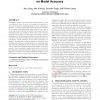Free Online Productivity Tools
i2Speak
i2Symbol
i2OCR
iTex2Img
iWeb2Print
iWeb2Shot
i2Type
iPdf2Split
iPdf2Merge
i2Bopomofo
i2Arabic
i2Style
i2Image
i2PDF
iLatex2Rtf
Sci2ools
ATAL
2015
Springer
2015
Springer
The Dependence of Effective Planning Horizon on Model Accuracy
For Markov decision processes with long horizons (i.e., discount factors close to one), it is common in practice to use reduced horizons during planning to speed computation. However, perhaps surprisingly, when the model available to the agent is estimated from data, as will be the case in most real-world problems, the policy found using a shorter planning horizon can actually be better than a policy learned with the true horizon. In this paper we provide a precise explanation for this phenomenon based on principles of learning theory. We show formally that the planning horizon is a complexity control parameter for the class of policies to be learned. In particular, it has an intuitive, monotonic relationship with a simple counting measure of complexity, and that a similar relationship can be observed empirically with a more general and data-dependent Rademacher complexity measure. Each complexity measure gives rise to a bound on the planning loss predicting that a planning horizon sh...
| Added | 16 Apr 2016 |
| Updated | 16 Apr 2016 |
| Type | Journal |
| Year | 2015 |
| Where | ATAL |
| Authors | Nan Jiang, Alex Kulesza, Satinder Singh, Richard L. Lewis |
Comments (0)

